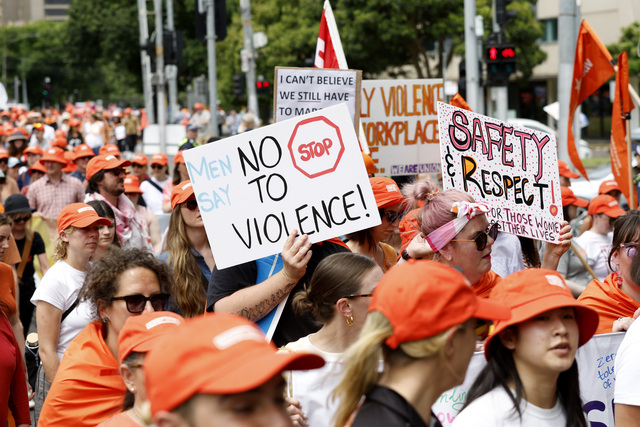As the 16 Days of Activism campaign begins to again work towards the end of gendered violence, Star Mail took a look back at over a decade of reporting.
Much of this work in bringing a spotlight to family and gender-based violence began with a team of reporters in 2011.
Mara Sowden Pattison, Casey Neill and Kath Gannaway led the charge at Mail News Group with a six week series sharing the stories of women who had fled such violence but also the remarkable people who had dedicated time to supporting these women through horrible circumstances.
Reflecting on the intention and catalyst for this series, Ms Gannaway said it was very much the story of one woman in 2010, Jeannie Blackburn, which prompted the need to bring gendered violence to the fore.
“Her partner had been jailed for abusing her and the abuse was horrific, she lost her eyesight in one eye. She came to us with that story, and he’d already been jailed, so there were no impediments to reporting on the story, and she just wanted to get that out there about abuse,” she said.
At the same time, Yarra Valley Community Health were working on teaching young boys about respectful relationships where they had a “strong focus on changing the perception and the behavior of young men at that age”, as well as a dedicated support program for women.
Ms Gannaway said the other prompt was the incredibly high rates of family violence incidents being recorded in the Yarra Valley region but at that time still “it was a personal thing between a man and a woman inside their house. It was no one else’s business, it was domestic”.
Bringing these stories into the light, Ms Gannaway said felt like a responsibility of the paper but one they had to do carefully, given the closeness to the community.
Despite being somewhat ahead of the curve in 2011, Ms Gannaway said unfortunately the same issues are still present today.
“The same issues that were written about then, about the controlling nature, about all the reasons behind it, and the indicators like isolating people from their families, all those things are still relevant,” she said.
“There’s still a trademark of family violence for the physical, mental, emotional or financial abuse but the housing situation [too] is a huge impediment.”
Adding to these factors Ms Gannaway said in her opinion, services have been reduced, particularly those in more regional townships.
“We’d like to think there are more services. I personally don’t think there are. I’m an expert on that, I think just anecdotally, I don’t know that there’s more or that it’s a better situation now than it was then.”
One thing Ms Gannaway said has improved however, is the police response in understanding and believing women when they say they have been abused.
A discussion that remains even decades later Ms Gannaway recalls is the one about pornography.
“It must be 20 years ago that Chum Creek Primary School had a massive community discussion on the effect of pornography on young men and women, really young teenagers, and even that long ago, they were talking about the effects and expectations of both men and women young which can often lead to violent situations,” she said.
Family and gendered violence over the last 13 years since the six week ‘Stop the Violence’ campaign has remained and will continue to remain a part of the Star Mail’s focus.
It has always been a promise of the Mail’s to hold people accountable where possible and to report truthfully but with the local community in mind.
“When you’re working in a smaller community, there are so many things you have to be so careful about, because you might think that you’re using a different name to someone’s is enough but people can be so easily identified by just a couple of comments or features or circumstances,” Ms Gannaway said.
“There’s a bigger responsibility to not put people that may have the best story in the world in a position which is more dangerous for them or even exposes them to sharing their most personal situations with the broader community, where everyone then knows their business.”
It is for that very reason Ms Gannaway said for the women who came forward in 2011 to tell their story, “they were very brave to do that” and “we were very grateful”.
“As a mum and grandmother, I just think those personal accounts, they’re terrible, but they’re the stories that get people to think about what’s happening and then all the other stuff has to follow as well.”
The 16 Days of Activism campaign runs from 25 November to 10 December every year, initially led by the Zonta Clubs around the world.
The history behind the 16 Days of Activism is both compelling and heartbreaking with the International Women’s Development Agency.
On 25 November 1960, sisters Patria, Minerva and Maria Teresa Mirabal, three political activists who actively opposed the cruelty and systematic violence of the Trujillo dictatorship in the Dominican Republic, were clubbed to death and dumped at the bottom of a cliff by Trujillo’s secret police.
The Mirabal sisters became symbols of the feminist resistance, and in commemoration of their deaths, 25 November was declared International Day for the Elimination of Violence against Women in Latin America in 1980.
This international day was formally recognised by the United Nations in 1999.
In June 1991, the Centre for Women’s Global Leadership (CWGL), alongside participants of the first Women’s Global Institute on Women, Violence and Human Rights, called for a global campaign of 16 Days of Activism Against Gender-Based Violence.
The 16 days begins with the International Day for the Elimination of Violence Against Women and ends with International Human Rights Day on 10 December– highlighting that violence against women is a fundamental violation of human rights.
A far cry from Australia, but the sisters’ legacy has reached all corners of the globe and kicks off the 16 days of activism that calls for an end to violence against women.







